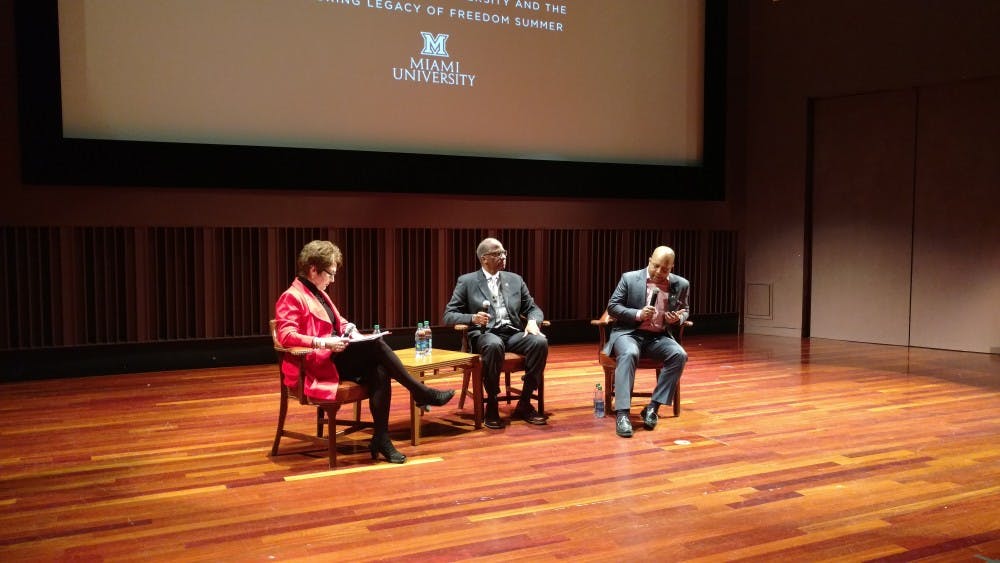Students, faculty and Miami alumni packed the auditorium of the National Underground Railroad Freedom Center in downtown Cincinnati, eagerly awaiting a discussion on "Race in America."
The voices of everyone assembled died down as the department of media, journalism and film (MJF)'s senior lecturer and area coordinator, Patricia Newberry, introduced the event's speakers and former Miami alumni: Wil Haygood '76, author of "The Butler: A Witness to History" and Boadway Distinguished Scholar in Residence in MJF and CBS correspondent and author, Jeff Pegues '92.
The event launched a new series, Spirit of '64: Miami University and the Enduring Legacy of Freedom Summer. The series will explore the lasting effects of Freedom Summer, when about 800 volunteers converged at the Western College for Women -- now Miami's Western Campus -- before traveling south to register black voters.
Miami President Greg Crawford welcomed the attendees who filled the 300-seat Harriet Tubman Theater. It's "not enough," Crawford said, to have discussions about race at Miami. Those conversations need to move beyond campus limits.
Both Haygood and Pegues' experiences in journalism affected their views on race relations in the United States.
In his time writing for both The Boston Globe and The Washington Post, race has been integral in much of Haygood's reporting, from writing about the South African apartheid to following Barack Obama on the campaign trail.
Haygood's biographies, including his most recent, "Showdown," about U.S. Supreme Court justice Thurgood Marshall, tell the stories of African Americans who altered the country's racial history.
It's impossible to know America's history, Haygood said, without knowing the "DNA of segregation" that runs through it.
"When we are quiet on the issue of race, other people come in and they fill the void with hatred and anger," Haygood said.
Pegues spoke about race in the context of his latest book, "Black and Blue: Inside the Divide Between the Police and Black America," and specifically referred to a Department of Justice report from Baltimore in which there have been 60 complaints in the last five years alleging unlawful strip searches in East Baltimore.
He told a story about one African American woman who was pulled over for a missing headlight and was forced to strip to her underwear on the sidewalk in broad daylight.
"People just want to be treated with dignity," Pegues said. "Both the cops and the people they serve. And I hope that armed with the facts people will begin to understand."
Enjoy what you're reading?
Signup for our newsletter
Haygood, a Patrick Henry fellow at Washington College in Chestertown, MD, discussed the time when he entered the fellows' house at the college.
His first question was, "have slaves ever been in this house?" In fact, many slaves had lived in the Patrick Fellows quarters serving former white, male fellows.
"Every morning when I wake up it's as if I'm walking on hallowed ground," he said.
Haygood specifically called on President Crawford to follow the example of Rev. Theodore M. Hesburgh, former president of Notre Dame University, where Crawford acted as a vice president and associate provost.
Hesburgh was known for pioneering civil rights and advancing equality throughout his public service career and additionally tackled immigration and refugees, nuclear proliferation, global hunger and poverty.
On June 21, 1964--the day that would become infamous during Freedom Summer for the murder of three young civil rights activists--Hesburgh got a call to join Dr. Martin Luther King's rally at Soldier Field in Chicago, IL as representative of the Catholic Church. His immediate response was to ask what time they needed him, even though then Mayor Richard Daley and Cardinal John Cody had declined to attend.
"Miami's new president needs to take up the mantle of Father Hesburgh," Haygood said. "No doubt he has the talents and gifts to do that."
After Pegues and Haygood each gave their individual presentations, Newberry led a moderated Q&A session in which she asked them about solutions to the race issue in America, the Black Lives Matter and allocated time for the audience to ask three questions to the authors.
Haygood raised the 2016 presidential election as source of contention for race relations and the impetus to start enabling racists, neo-nazis and the fascist movement again.
"When we vote against our own best interests," Haygood said. "Then as a nation we suffer."
@cadoyle_18
@emilye_williams




